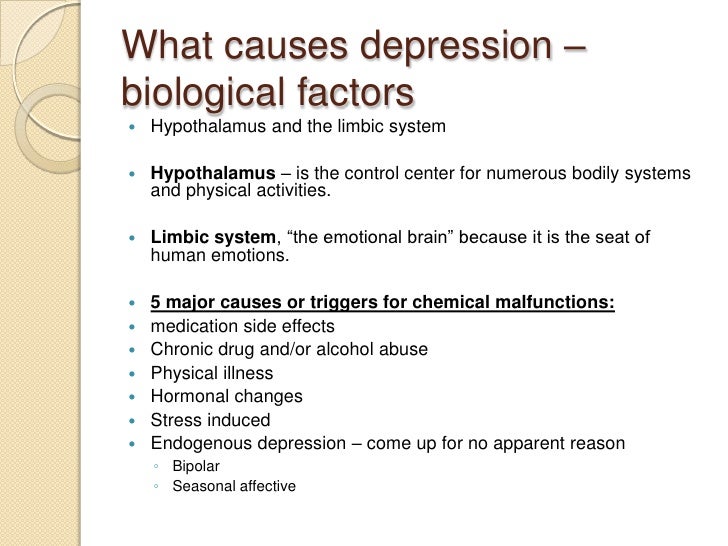What Causes Biological Depression
Depression is a common mental health disorder that affects millions of people worldwide. Its prevalence is increasing every year, and the impact on the individual and society is significant. The complexity of its causes and treatment requires a multi-dimensional approach to understand and manage the condition. In this article, we will explore the biological and environmental causes of depression, and the role they play in its onset and perpetuation.
The Biological Causes of Depression

The biological causes of depression are complex. Several factors influence mood regulation, and their interaction and impact on the brain's chemistry contribute to the development of depression.
Neurotransmitters are chemicals that transmit signals between the neurons in the brain. The imbalance of these chemicals, such as serotonin, dopamine, and norepinephrine, has been associated with depressive symptoms. The reduction of serotonin levels, for example, has been linked with a decrease in mood stability and an increased risk of depression.
In addition to neurotransmitters, genetics also play a significant role in depression vulnerability. The heritability of depression is estimated to be between 30 and 40 percent, and specific genes have been identified to increase the risk of depression. The serotonin transporter gene (5-HTT), for instance, has been associated with higher susceptibility to depression in individuals facing stressful life events.
Other biological factors such as hormonal imbalances, inflammation, and physical health conditions, like chronic pain and cardiovascular disease, also contribute to depression risk.
The Environmental Causes of Depression

The environmental causes of depression relate to the influence of external factors, such as social, economic, and cultural factors, on an individual's mental health. These factors can interact with biological factors and trigger the onset of depressive episodes.
One of the most influential environmental factors to depression is stress. Stressful life events, like the loss of a loved one, job loss, or financial difficulties, can cause significant psychological distress and lead to depression onset. The individual's response to stress also plays a critical role in determining the impact on mental health. Those who experience persistent stress have a higher chance of developing depression, as their brain's stress regulation system becomes dysregulated, causing biological changes and increasing vulnerability to mood disorders.
Social and environmental factors, such as poverty, low social support, discrimination, and traumatic experiences, also increase depression risk. These factors are prevalent in disadvantaged populations and contribute significantly to health disparities and the burden of depression.
Treatment for Depression
Depression treatment requires a multidisciplinary approach that addresses the biological, environmental, and psychological factors influencing the individual's mental health. The most common treatment approaches include medication, psychotherapy, and lifestyle changes.
Medication for depression aims to rebalance the brain's chemical composition and alleviate depressive symptoms. Antidepressants, such as selective serotonin reuptake inhibitors (SSRIs), are the most commonly prescribed medication for depression. However, medication alone is not always effective, and a combination of medication and psychotherapy is often recommended to maximize recovery.
Psychotherapy, like cognitive-behavioral therapy (CBT), is an evidence-based approach to treating depression that focuses on identifying and changing the negative thought patterns that contribute to depression. CBT is effective in reducing depressive symptoms, preventing relapse, and improving the individual's overall mental health and functioning.
Lifestyle changes, like exercise, healthy eating habits, and stress management techniques, are also recommended as adjunct therapy for depression. Exercise has been shown to increase the production of endorphins, the brain's feel-good chemicals, and improve mood stability. A balanced diet with essential nutrients, like omega-3 fatty acids, has also been linked with lower depression risk. Techniques like mindfulness meditation and yoga can also help individuals manage stress and improve overall mental well-being.
Conclusion
Depression is a complex disorder with multiple causes and risk factors. The biological, environmental, and psychological factors that contribute to its onset and perpetuation require a multi-dimensional approach to understanding and managing the condition. A combination of medication, psychotherapy, and lifestyle changes is the most effective approach to treating depression and achieving sustained recovery. By addressing the underlying factors that contribute to depression, individuals can regain control of their mental well-being and live a fulfilling life.